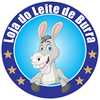Use of Donkey Milk in Children with Cow’s Milk Protein Allergy
Human breast milk is the best nutritional support that ensures the right development and influences the immune status of the newborn infant. However, when it is not possible to breastfeed, it may be necessary to use commercial infant formulas that mimic, where possible, the levels and types of nutrients present in human milk. Despite this, some formula-fed infant develops allergy and/or atopic disease compared to breast-fed infants. Cow’s milk allergy can be divided into immunoglobulin IgE mediated food allergy and non-IgE-mediated food allergy. Most infants with cow’s milk protein allergy (CMPA) develop symptoms before 1 the month of age, often within 1 week after the introduction of cow’s milk-based formula. Donkey milk may be considered a good substitute for cow’s milk in feeding children with CMPA since its composition is very similar to human milk. Donkey milk total protein content is low (1.5–1.8 g/100 g), very close to human milk. A thorough analysis of the donkey milk protein profile has been performed in this study; the interest was focused on the milk proteins considered safe for the prevention and treatment of various disorders in humans. The content of lactoferrin, lactoperoxidase, and lysozyme, peptides with antimicrobial activity, able to stimulate the development of the neonatal intestine, was determined. Donkey milk is characterized by a low casein content, with values very close to human milk; the total whey protein content in donkey milk ranges between 0.49 and 0.80 g/100 g, very close to human milk (0.68–0.83 g/100 g). Among whey proteins, the α-lactalbumin average concentration in donkey milk is 1.8 mg/mL. The results of this study confirmed the possibility of using donkey milk in feeding children with CMPA.
